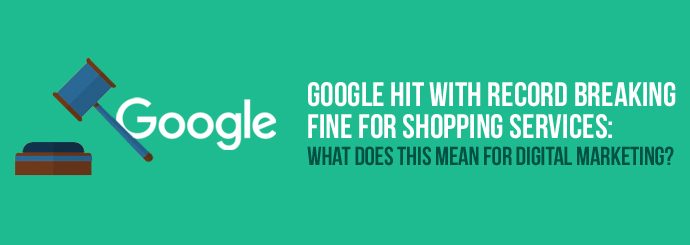
Following a seven-year investigation by the European Commission, it was revealed today that Google will be fined a record-breaking £2.1 billion for abusing its power and dominating search results with its own AdWords-driven shopping services. This is the largest fine to be given out by the EU for a monopoly abuse case.
The case concludes that Google has been favouring its own comparison shopping service and the products on Google Shopping in the SERPS, thereby demoting competitor sites. Under EU antitrust rules, this is classed as illegal and a distortion of the market. The European Commission believes that this practice has denied other companies the ability to compete based on their merits, as well as denying consumers an accurate choice of products and services.
Google fervently denies these claims and stands by their opinion that their method provides consumers with the best shopping experience, making it easier for them to find the products they want.
However, despite their denial, Google has been given 90 days to cease these practices or face further penalties.
So, what could this mean for Digital Marketing?
Well, if Google have to change the appearance of its search engine results, something that they've systematically changed to dominate the online advertising space, then surely this will have a huge impact on their income streams, and on how we advertise websites! Google have 90% of the search market share in Europe alone, and whilst this form of advertising is becoming more and more expensive with its auction-style bidding, there's unfortunately no getting away from the fact that it works, and many businesses rely on it heavily for their businesses.
At the moment, Google generates a massive amount of its income through its advertising platform, and this fine whilst seemingly huge and record-breaking, is nothing compared to the loss they would incur if they had to stop using it. It's hard to see how they will get around this anti-trust ruling, but it will surely have an effect on millions of companies employing the advertising platform, and all those companies like ourselves who are work very closely with it.
Year by year, Google Ads are becoming more of a priority to Google, with the current number of Ads standing at 4 at the top of each SERP. This, along with the introduction of Google Business and local services, means that no organic search results are shown to users ‘before the fold’.

As can be seen in the image above, the entire right-hand side of the page is dominated by Google Shopping adverts. These are also paid for adverts, as can be seen by the small ‘sponsored’ badge at the top of the page. Due to this, most of the SERPs are dominated by adverts which have been paid for by those advertising companies. Google Ads even appear at the bottom of the page, meaning only the middle 10 results are organic. From this, it is easy to agree that consumers may not be provided with the best possible choice when it comes to shopping on Google.
You have to take your hats off to Google for their genius. Where else in the world can you find an example where a business owner pays an advertising company hundreds of thousands, or even millions of pounds in advertising spend, where you can't speak to anyone, you can't get any loyalty discounts, and you even have to rely on their own statistics about the click costs, click stats, fraud clicks, etc. They absolutely dominate this space, they most definitely monopolise, and they do of course favour anything that earn's money for Google! But, is this unfair practice worthy of a fine, or just a phenomenally intelligent advertising platform?
It is unsure what changes Google may make to the world’s most popular search engine, but if they do impose changes it is likely that they will create a new way to fill the gap left by the favouritism of its own Google Shopping channel. Digital Marketers may need to change their methods to fit in with the changes and come up with new marketing strategies. It will definitely be interesting to see where this goes.
However, there is also a chance that Google will not impose any changes at all and just pay the higher fine after the 90-day period. This fine is the first in the three-pronged investigation into the companies practices and so over the coming months, we may see the super-power fined for other anti-trust practices.
For more updates on this story, you can follow our Twitter or our Facebook here!